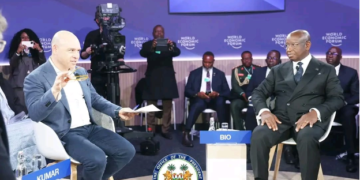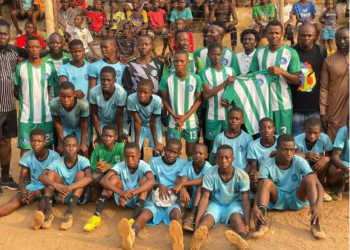By Alieu Amara Suwu
Reading has the ability of not only exposing you to ideas and making you a certified interlocutor of the knowledgesphere. It also boosts the grammar bank of pupils, students, and bookstagrammers, people who have developed a love for reading, using it as a tool against emotional sterility.
As a reading explorer who has crossed paths with several literatures during and after my college life, I could sense one that speaks to the needs of learning students that anticipate reading change. ‘So the path does not die,’ an African literature that evolves with time, strikes a balance between African conventionalism and imperialism, portraying an idea of generalism that clashes with specificism. This creates an impression in the minds of readers to make decisions.
The literature also portrays an ideal of African fashion, capturing that which is inherent in West Africa. The dress of a typical West African setting.
Phina, a major character of the literature, had her early childhood in Africa. And on her struggle, she emigrated to Europe, where she experienced a different culture but decided to return to her land. This dual portrait advances two contrasting arguments on the issue of female genital mutilation (FGM), which is a cultural ideological warfare in the African continent.
This literature enables African students, specifically Sierra Leonean students, to understand the cultural values of FGM and, at the same time, the inimical nature of the said values. And in the end appeals to the intellect of prospective readers to devise an approach to the issue.
This literature also premiums the typical African fashion, specifically in West Africa, embellished by western ideas on how it has been fought off by western civilization. In some parts of the literature, the word fashion is used, which in that case represents the sense of African looks and how they are represented in the text. This gives publicity to African values and creates a sense of awareness in African students about the richness of their culture.
The educational sector in Sierra Leone has been revolutionized, and much preference is given to African literatures. But one should not forget that the strength of the West has conditioned the flow of knowledge, and a literature that strikes the balance between these two civilizations for the purpose of learning should be given more preference.
‘So the path does not die’ also appeals to the social quotient of pupils, as it will help students understand the significance of mingling with their peers and how it contributes to learning. Engaging with your peers in school is one of the greatest means of knowledge sharing. It is called social learning. Students who are keen on such education are the best at keeping human relationships and are experts in noticing a relationship that is toxic. This could help in designing a path to success and how it could be achieved.
The depth of academia implored and the richness of the African culture displayed and how it would benefit students in understanding their African values in the context of western civilization makes it all the more reason students should read this literature—‘So the path does not die’—in school.
























